[ 153 ]
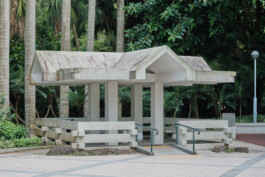
1
Iain Cocks (HK)
Hong Kong
(1) Please introduce yourself: What is your name, where are you from, what do you do?
My name is Iain Cocks, I was born and raised in London but now call Hong Kong home. I’m a teacher by day, moonlighting as a photographer.
(2) What is your relationship with photography and how did you get into it?
Initially, photography gave my curiosity to explore a more tangible purpose. I would use it like a visual diary, recording any interesting things I came across on my travels or just while walking around. After a while I noticed certain themes emerging and my work developed from that. In an age where our attention has been commodified, I find that the simple act of looking with intent can be beneficial. Photography promotes this state of mindfulness and I find it quite therapeutic. As a kid I was always curious about photography and even took a short darkroom course at one point. I remember it was like magic watching the prints develop in the dim red light, that distinctive chemical smell floating in the air. But it was only after borrowing my dad’s old SLR kit in my late teens that I started to think about it more creatively.
(3) What do you think triggers you to photograph in a certain moment? Is it planned or solely driven by intuition?
A bit of both: I’m generally quite methodical in terms of location and subject matter, to the extent of using spreadsheets to plan and keep track of my projects. But when I’m shooting it’s mostly down to intuition. I move around a lot, often walking in circles to chase the light and find good compositions. It’s like a treasure hunt!
(4) What is the story you want your pictures to tell?
It depends on the project, but I’d say an overarching theme is looking at the overlooked and finding beauty in banality. I shoot a lot of architecture, mixed in with scenes of daily life—or better yet, traces of daily life. I prefer to shoot in places that show their age, that are lived-in, over something shiny, new and sterile.
(5) Which city would you like to visit the most, and why?
There are plenty on my list, but one that stands out is Chandigarh, in northern India. It’s a city planned by (or at least credited to) Le Corbusier, who also designed several buildings there. I’m a big fan of dusty modernist architecture and Chandigarh has lots of it.
(6) What is your personal relationship to cities and how do you perceive them as places in general?
They’re places I’m naturally drawn to. I love the energy, the density, the sense of history. It’s healthy to get out of them every now and then, but I’m always glad to return. Some people dream of retiring to the countryside but that’s not for me. Besides, I have trouble sleeping if it’s too dark and quiet. Hong Kong, where I live and work, took the concept of a city and ran with it. It can be intense, but brimming with life and photographic potential.
(7) What is the driving force behind creation?
I think it’s just Human nature to create things. It expresses itself in different ways for different people, but it’s a shared impulse.
(8) Which project did you never finish?
My long-term projects are constantly shifting and evolving, so they’re never really finished, just changing direction over time. Having said that, I’ve been working on a book’ for far too long…
(9) What is that one thing you have never managed to photograph and is now gone for good?
Hong Kong is a city of disappearance—even things we take for granted can vanish overnight. As a result, there are countless things I never managed or even thought to photograph in time. This sense of urgency was actually one of the main driving forces behind my photographic development—I thought I should document things before they were gone or changed for the worse and this pushed me to go out and shoot more. As a result, there are many things I did manage to capture before they disappeared—although this also makes their loss more tangible.
(10) If you could travel back / forth in time, what advice would you give your younger/older self?
Isn’t the first rule of time travel to never meet yourself?
(11) What do you prefer saying: to «take a photograph» or to «make a photograph», and why?
It’s really just semantics—they mean the same thing. The emphasis is on taking action, not taking possession or receiving something passively. I understand the argument for using the term ‹make› instead, but I think people risk taking themselves a bit too seriously.
(12) What is the most interesting experience you have had while photographing?
A couple of years ago I was followed around by a film crew for an interview I did with Apple Daily, a popular (now sadly defunct) HK newspaper. I’m usually behind the camera trying to be as inconspicuous as possible, so having the tables turned like that was disconcerting but quite fun.
(13) If it wasn’t for photography, what would you be interested in doing instead?
Would choosing videography be cheating?
(14) How would you describe one of your pictures to a visually impaired person?
Hard concrete and soft light.
(15) What are you currently working on, and—if there is—what is your next project or journey?
I’m still working on my HK public housing project, as I find the estates really conductive environments to shoot in. I spent a good portion of last year compiling a collection of concrete mushroom shelters that should be wrapping up soon and I hope to do something with. I’d also like to shoot more further afield in China, now that the border is open again. I have a few ideas for short projects there and a trip booked for Easter, so expect to see something soon…
Thank you, Iain.
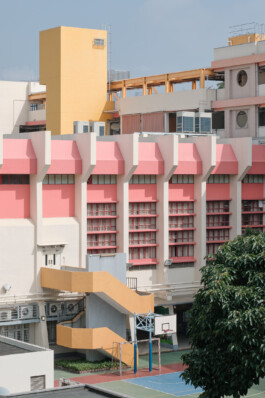
2
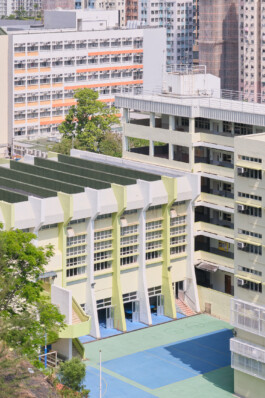
3

4
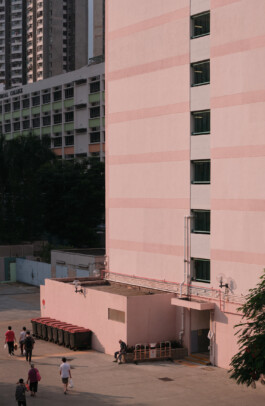
5
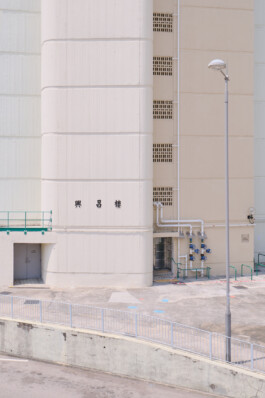
6
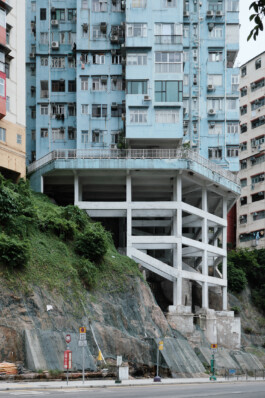
7
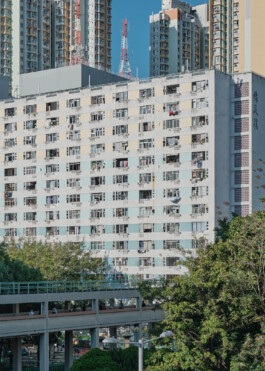
8
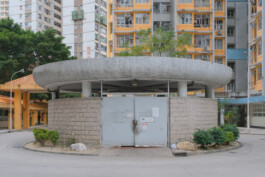
9

10
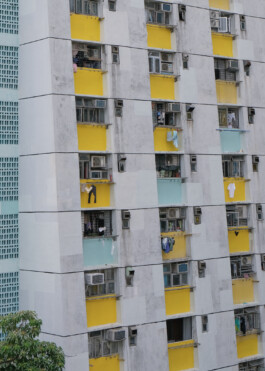
11
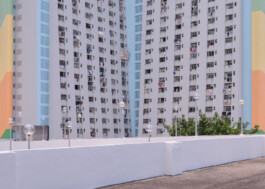
12
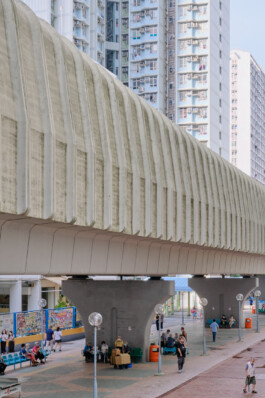
13
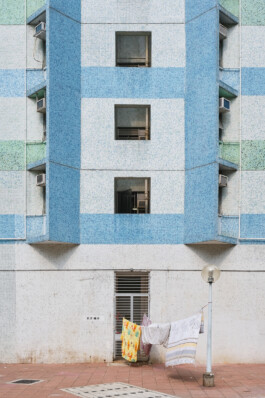
14
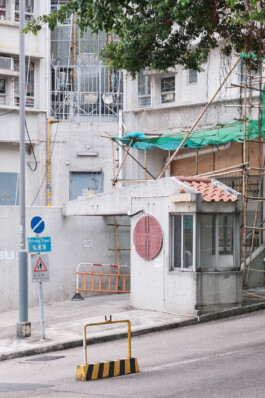
15
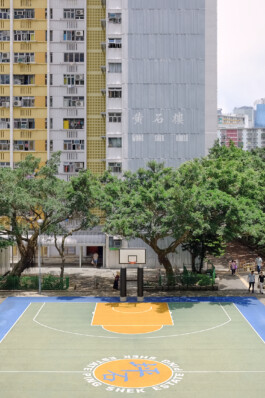
16
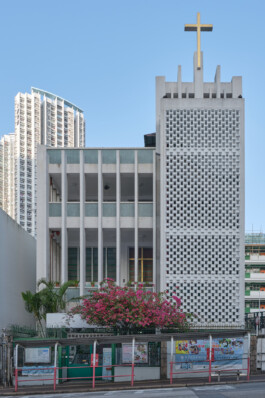
17
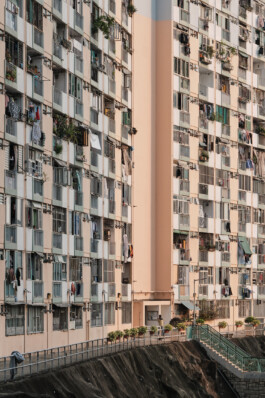
18
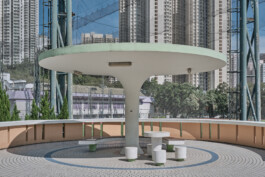
19
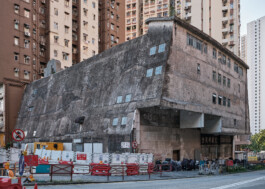
20
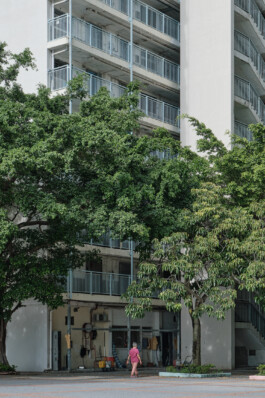
21

22

23
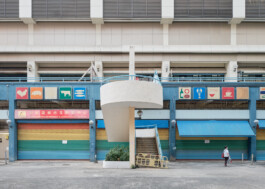
24
Images
1–24 Iain Cocks, Hong Kong, 2021–2024.
Interview

1
Iain Cocks (HK)
Hong Kong
(1) Please introduce yourself: What is your name, where are you from, what do you do?
My name is Iain Cocks, I was born and raised in London but now call Hong Kong home. I’m a teacher by day, moonlighting as a photographer.
(2) What is your relationship with photography and how did you get into it?
Initially, photography gave my curiosity to explore a more tangible purpose. I would use it like a visual diary, recording any interesting things I came across on my travels or just while walking around. After a while I noticed certain themes emerging and my work developed from that. In an age where our attention has been commodified, I find that the simple act of looking with intent can be beneficial. Photography promotes this state of mindfulness and I find it quite therapeutic. As a kid I was always curious about photography and even took a short darkroom course at one point. I remember it was like magic watching the prints develop in the dim red light, that distinctive chemical smell floating in the air. But it was only after borrowing my dad’s old SLR kit in my late teens that I started to think about it more creatively.
(3) What do you think triggers you to photograph in a certain moment? Is it planned or solely driven by intuition?
A bit of both: I’m generally quite methodical in terms of location and subject matter, to the extent of using spreadsheets to plan and keep track of my projects. But when I’m shooting it’s mostly down to intuition. I move around a lot, often walking in circles to chase the light and find good compositions. It’s like a treasure hunt!
(4) What is the story you want your pictures to tell?
It depends on the project, but I’d say an overarching theme is looking at the overlooked and finding beauty in banality. I shoot a lot of architecture, mixed in with scenes of daily life—or better yet, traces of daily life. I prefer to shoot in places that show their age, that are lived-in, over something shiny, new and sterile.
(5) Which city would you like to visit the most, and why?
There are plenty on my list, but one that stands out is Chandigarh, in northern India. It’s a city planned by (or at least credited to) Le Corbusier, who also designed several buildings there. I’m a big fan of dusty modernist architecture and Chandigarh has lots of it.
(6) What is your personal relationship to cities and how do you perceive them as places in general?
They’re places I’m naturally drawn to. I love the energy, the density, the sense of history. It’s healthy to get out of them every now and then, but I’m always glad to return. Some people dream of retiring to the countryside but that’s not for me. Besides, I have trouble sleeping if it’s too dark and quiet. Hong Kong, where I live and work, took the concept of a city and ran with it. It can be intense, but brimming with life and photographic potential.
(7) What is the driving force behind creation?
I think it’s just Human nature to create things. It expresses itself in different ways for different people, but it’s a shared impulse.
(8) Which project did you never finish?
My long-term projects are constantly shifting and evolving, so they’re never really finished, just changing direction over time. Having said that, I’ve been working on a book’ for far too long…
(9) What is that one thing you have never managed to photograph and is now gone for good?
Hong Kong is a city of disappearance—even things we take for granted can vanish overnight. As a result, there are countless things I never managed or even thought to photograph in time. This sense of urgency was actually one of the main driving forces behind my photographic development—I thought I should document things before they were gone or changed for the worse and this pushed me to go out and shoot more. As a result, there are many things I did manage to capture before they disappeared—although this also makes their loss more tangible.
(10) If you could travel back / forth in time, what advice would you give your younger/older self?
Isn’t the first rule of time travel to never meet yourself?
(11) What do you prefer saying: to «take a photograph» or to «make a photograph», and why?
It’s really just semantics—they mean the same thing. The emphasis is on taking action, not taking possession or receiving something passively. I understand the argument for using the term ‹make› instead, but I think people risk taking themselves a bit too seriously.
(12) What is the most interesting experience you have had while photographing?
A couple of years ago I was followed around by a film crew for an interview I did with Apple Daily, a popular (now sadly defunct) HK newspaper. I’m usually behind the camera trying to be as inconspicuous as possible, so having the tables turned like that was disconcerting but quite fun.
(13) If it wasn’t for photography, what would you be interested in doing instead?
Would choosing videography be cheating?
(14) How would you describe one of your pictures to a visually impaired person?
Hard concrete and soft light.
(15) What are you currently working on, and—if there is—what is your next project or journey?
I’m still working on my HK public housing project, as I find the estates really conductive environments to shoot in. I spent a good portion of last year compiling a collection of concrete mushroom shelters that should be wrapping up soon and I hope to do something with. I’d also like to shoot more further afield in China, now that the border is open again. I have a few ideas for short projects there and a trip booked for Easter, so expect to see something soon…
Thank you, Iain.

2

3

4

5

6

7

8

9

10

11

12

13

14

15

16

17

18

19

20

21

22

23

24
Images
1–24 Iain Cocks, Hong Kong, 2021–2024.